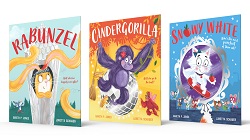 David Boni
David BoniCastles and Baddies and Problems
After retelling Cinderella, Rapunzel and now the story of Snow White, Gareth P Jones ponders the long-lasting appeal of fairy tales.
 Knowing I had to write a piece about why we love Fairy Tales, my first instinct was to ask my family. My 7-year-old daughter didn’t hesitate to reply.
Knowing I had to write a piece about why we love Fairy Tales, my first instinct was to ask my family. My 7-year-old daughter didn’t hesitate to reply.
‘Castles and baddies and problems that get solved.’
I jotted this down then asked my wife what she thought. ‘Because they’re magical,’ she said. ‘And they teach you something.
Next, I put the question on Twitter.
Philip Ardagh was quick off the mark quoting Neil Gaiman – who in turn was paraphrasing GK Chesterton: ‘Fairy tales do not tell children the dragons exist. Children already know that dragons exist. Fairy tales tell children the dragons can be killed.
Claudia White gave her own thoughts: ‘We love worlds where magic makes things more exciting, frightening and better… Fairy tales can give our imaginations license to believe the unbelievable in our quest to conquer our own worlds.’
Kimberley Pauley – who is currently working on a project that brings fairy tales to D&D – likes how they ‘teach us to look with suspicion on someone when they offer us something too good to be true.’
Art historian, Andréa Gates pointed out that one of Bruno Bettleheim’s key points in The Uses of Enchantment is that fairy tales endure because they reflect our innate desire to become better people.
Melissa Joulwan, who hosts a podcast called Strong Sense of Place, talked of how anything can happen in fairy tale. As she says, ‘when the words Once upon a time are spoken, all bets are off.’
I had lots of excellent replies – all valid, interesting and well-articulated, but the more I thought about them, the more they all seemed to boil down to those points that my wife made. We like fairy tales because they are magical and because they teach us something about our world and ourselves. My 11-year-old son had a different take.
When I asked him the question he shrugged and replied, ‘I don’t. Most of the famous ones are all pretty similar…. It’s all damsels in distress then a prince who has to get past something like a dragon or a curse to rescue her.’
I like this response because it’s honest and it reminds me of my own feelings about fairy tales. One of the reasons I chose to retell classic stories in my Fairy Tales for the Fearless series, is because I felt like many of these stories needed fixing. As illustrator James Mayhew says, ‘the relentless heterosexist outcomes can be very damaging.’ Storyteller, Vanessa Woolf adds, the worst of these are those ‘rewritten in the 1950s as tools of control for children.’
It’s the desire of authors, illustrators, and storytellers to reinterpret and reimagine that keeps fairy tales relevant. Different generations feel  the need to retell these stories to suit their needs. The classic Fairy Tales such as Cinderella, Rapunzel and Snow White will endure because nostalgia is inextricably woven into the fabric of children’s fiction, but it’s also worth remembering that brand new fairy tales are being written every day.
the need to retell these stories to suit their needs. The classic Fairy Tales such as Cinderella, Rapunzel and Snow White will endure because nostalgia is inextricably woven into the fabric of children’s fiction, but it’s also worth remembering that brand new fairy tales are being written every day.
What makes a story a fairy tale? There are lots of longer, well researched replies to this question in books and articles, but I think I still like my daughter’s answer best: castles and baddies and problems that get solved.
Gareth P. Jones is the author of the picture books The Lion on the Bus, The Dinosaurs are Having a Party! and Are You the Pirate Captain? as well as a number of fiction for young readers, The Dragon Detective Agency and Ninja Meerkats series, as well as The Considine Curse, winner of the Blue Peter Book of the Year Prize 2012. Snowy White is the third in the Fairy Tales for the Fearless series, illustrated by Loretta Schauer, and follows Rabunzel and Cindergorilla.






